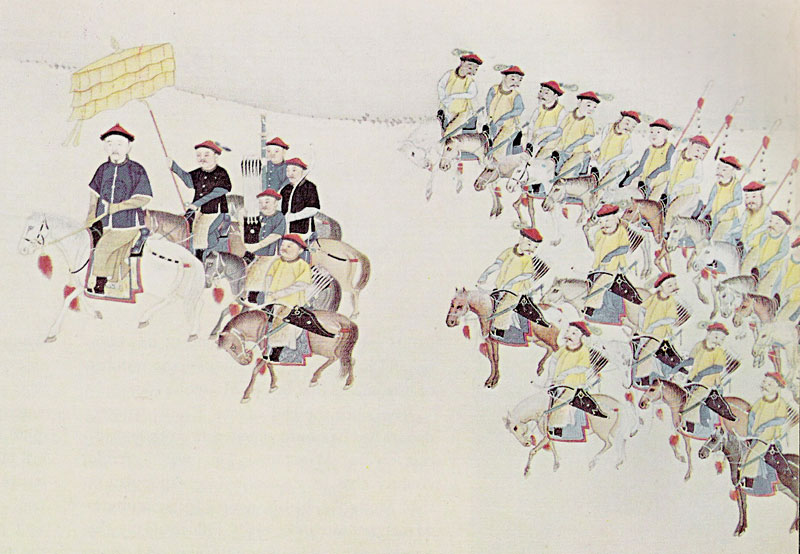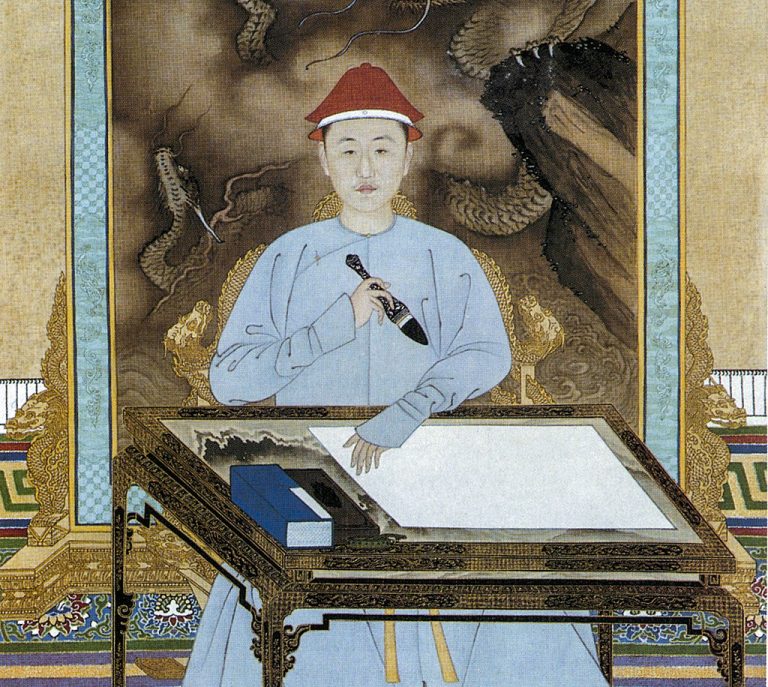Emperor Kangxi (康熙) was the longest reigning emperor in China. Coming into power at the age of seven, he ruled from 1661-1722. The second emperor of the newly-established Manchu Qing Dynasty, Kangxi was both wise and ambitious, and brought great prosperity to China. He was described in the Qing Historical Manuscript (清史稿) as a benevolent ruler of great virtue and compassion.
People later regarded him as a sage and called him Qing Shengzu (清聖祖), or “The Holy Ancestor of the Qing Dynasty.” He demonstrated great kindness and initiated many policies that benefited the Chinese people for generations.
Looked after his subjects with kindness and humility
In July of the 18th year of the Kangxi lunar calendar, an earthquake struck the capital of Beijing. Emperor Kangxi issued an edict to allocate 100,000 yuan from the royal treasury to provide relief and care for the people, repairing the damage to people’s homes at his own expense.
Emperor Kangxi summoned his ministers and said,
“I am not virtuous. The earthquake is a warning that my governance has not been in harmony. Once things have stabilized, we must find the cause of the disaster.”
Success
You are now signed up for our newsletter
Success
Check your email to complete sign up
“Is it because the government officials have exploited the herdsmen? Or have the ministers formed cronies for their own gains? Is it because the soldiers haven’t been instructed not to burn or loot? Or are the collected taxes unfair? Are our judging officials unjust? Or do officials and ministers let their men take advantage of the common people?”
“Any one of these things would be enough to cause a disaster. Only if we govern in accordance with the law of heaven and treat every matter with propriety and fairness, can we hope for harmony and prosperity. I have revealed my heart, and encourage the ministers and officials in China and abroad to do the same.”

The Kangxi Emperor often traveled south to examine the rivers on matters regarding water projects. In March of the 44th year of the Kangxi lunar calendar, the Kangxi Emperor told the minister while inspecting river projects,
“There are hundreds of thousands of people on the road to welcome me daily. When I return it will be time to tend the wheat. The people should pay attention to their farming [rather than me].”
In April of the 46th year of the Kangxi lunar calendar, Kangxi Emperor issued an edict saying,
“I am inspecting the river, and stationed in Huai Shang. The officials and people of Jiang and Zhe Provinces requested to see me. The wheat has just ripened, but people crowding along the river to see me have trampled the crops. We must tell people to stop welcoming and seeing me off. I would like to show that I value agriculture and love the people.”
Cancelled government project that caused suffering
In February of the 46th year of the Kangxi lunar calendar, the Kangxi Emperor visited the Yellow River. He landed at the ” Qingkou (清口)” to arrive at the ” Caojiamiao (曹家廟).” Seeing that the terrain was mostly impassable hills and mountains while the river project had been damaging people’s houses and graves, the Kangxi Emperor reprimanded Zhang Penghe (張鵬翮) and other officials and suspended the river project.
The residents along the river were touched and hailed their gratitude to Kangxi Emperor, who ordered his officials to survey an alternative suitable site for the river canal.
Accepted responsibility but declined recognition
In December of the 20th year of the Kangxi lunar calendar, the ministers wished to give the emperor an honorary title. Kangxi Emperor refused, decreeing,
“Since the insurgency, the imperial army has been exhausted militarizing. The country suffers from shipping and transporting military supplies. In addition to the drought and floods, calamities are seen frequently. This is all due to my lack of virtue. “
“Relying on the ancestors’ spirits, I have been able to defeat the insurgents. We should use our talents well and give rest to the people. How can I be complacent and want a useless title?”
In March of the 60th year of the Kangxi lunar calendar, the ministers again wished to honor him with a title. Again Kangxi Emperor disapproved,
“An honorary title is a tradition of bad habits, a word game literally, to deceive the uneducated and unskilled ruler. The family law of this dynasty is to only love the people. With soldiers sleeping in the field and people suffering, I have no time for titles. I have to cultivate myself and manage state affairs well.”
Warned against interfering with people’s livelihood
In February of the 51st year of the Kangxi lunar calendar, the governor of Fujian and Zhejiang, Fan Shichong (范時崇), submitted a petition that suggested, “Local officials should restrict coastal fishing boats, allowing only single-masted fishing boats to go to sea, but not to sail across the province, so as to prevent piracy.”
Kangxi Emperor replied, “This is not feasible. It’s equivalent to having the fishermen incorporated into the navy battalion. Officials and soldiers could still violate and oppress the fishermen. How can this eradicate piracy? What place is free from robbery? Restrictions should be used to benefit people, not as a tool to harass them.”
Showed respect and provided care for the elderly
It is a traditional virtue to respect and care for the elderly. When society fails to care for the elderly, it means social morality has fallen to a very low level. It is an aspiration of an ideal society to “care for the aged as if they were my own,” yet Kangxi Emperor managed to achieve it. Kangxi Emperor personally appointed a government agency to provide for the elderly widows and seniors who lived alone.
In March of the 52nd year of the Kangxi lunar calendar, the Kangxi Emperor issued an edict: “The government will provide for widows, widowers and seniors who are alone.”
He said: “In ancient times, to respect the wise and provide for the elderly was a priority. When everyone shows filial respect for the elderly and love for their brothers, sincerity and compassion will reign.”
Nearly 600 seniors aged 80 and above received silver and gold that day, demonstrating the emperor’s respect and compassion for the elderly.
Promoted education
In February of the 54th year of the Kangxi lunar calendar, the Kangxi Emperor toured Ji Dian (畿甸). He said to the governor Zhao Hongxie (趙弘燮),
“I often tour Ji Dian and see people’s livelihood has gotten better. But fewer people are reading, and it has to do with the customs. It is advisable to set up schools in the poor and remote areas to encourage people to learn and study. Your local officials should pay attention to this.”
Governing in accordance with the laws of heaven brings blessings on all people. In contrast, the Chinese Communist Party’s destruction of tradition and morality seems to bring one disaster after another. Kangxi Emperor always put his people first, and looked within for his own faults when problems arose. His virtuous nature is what allowed China to prosper and flourish in the past.













